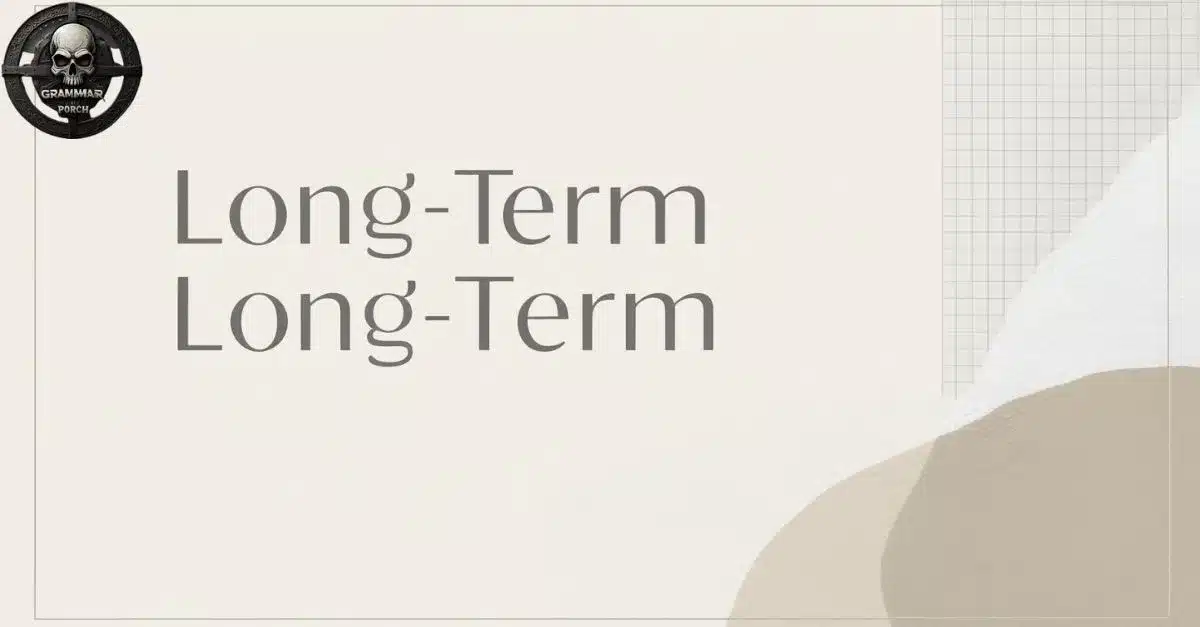When writing in English, using “long term” or “long-term” correctly can be confusing, especially since both forms often appear in similar contexts. In American English, these terms may seem interchangeable, but understanding when to use each is key for clarity in writing.
Incorrect usage can lead to misunderstandings, particularly in professional or academic writing. Let’s explore the difference between “long term” and “long-term” and review the correct usage to improve writing precision.
Why is There Confusion?
The confusion between “long term” and “long-term” comes from English hyphenation rules. “Long term” is a noun phrase for an extended period, while “long-term” is a compound adjective describing something that lasts.
For example, you’d say, “Investing is a long-term commitment,” but, “My investment pays off in the long term.”
Misusing the hyphen can change a sentence’s meaning and impact clarity. Grammar rules advise using hyphens for adjective usage in compounds, but not for noun forms, ensuring precise, clear writing.
Is the Long Term Word Correct?

Definition
In American English, “long term” as a single phrase without a hyphen functions as a noun phrase. As a noun, it refers to a span of time that extends far into the future. “Long term” can refer to future planning or prolonged periods in general.
For example, “He has set up his finances for the long term” uses “long term” as a noun structure.
Meaning
Using “long term” in this way denotes a future time frame without assigning any particular characteristics to it. It functions as an objective term that describes a period without modifying other nouns.
Essentially, when you use “long term” without hyphenation, it serves as a standalone noun form, without hyphen or modifiers. Remember, in this usage, “long term” is independent and doesn’t directly describe any other word.
Is the Long-Term Word Correct?

Definition
“Long-term,” with a hyphen, serves as an adjective that describes another noun. For instance, “a long-term project” or “long-term goals” indicates that the commitment, project, or goals will last over an extended period.
Hyphen rules are crucial in this case since the hyphen links “long” and “term” as a single unit to describe the noun.
Meaning
Using “long-term” as an adjective gives the phrase a descriptive role, characterizing whatever it modifies as enduring or lasting for a long time.
Correct usage of “long-term” as a compound adjective depends on keeping the hyphen to signal its function as a single descriptor. This form is essential in any writing that demands precision and clarity.
Quick Summary of Long Term or Long-Term
| Usage Form | Function | Example |
| Long Term | Noun | “I’m investing for the long term.” |
| Long-Term | Adjective | “She has long-term goals for her career.” |
Remember: Use “long term” when referring to a time period as a noun, and “long-term” when describing something as lasting a long time.
Pronunciation of Long Term or Long-Term
Both “long term” and “long-term” are pronounced the same way, which adds to the confusion. There is no pause or stress difference in spoken English, though their functions are distinct in writing. Recognizing each usage helps ensure that the correct term is applied when writing.
Part of Speech: Long Term or Long-Term
“Long term” works as a noun phrase, typically standing alone or as the subject or object in a sentence. Conversely, “long-term” is used as a compound adjective, which modifies nouns to indicate a prolonged effect. Knowing these distinctions improves sentence structure and accuracy in writing.
Side-by-Side Comparison of “Long Term” vs “Long-Term”
To further clarify, here’s a side-by-side comparison to show the distinct roles of “long term” as a noun and “long-term” as an adjective.
| Phrase | Part of Speech | Example |
| Long Term | Noun Phrase | “I’m saving for the long term.” |
| Long-Term | Adjective | “He has long-term goals.” |
“Long Term” as a Noun Phrase
When used as a noun phrase, “long term” functions independently and does not modify other words. It signifies an extended duration or prolonged time. For example, “Planning for the long term can secure your future” shows “long term” as a noun that refers to a future time frame.
“Long-Term” as an Adjective
In its adjective form, “long-term” always includes a hyphen and describes nouns to indicate duration. For example, “a long-term strategy” uses “long-term” to specify the strategy’s intended length. This adjective usage is crucial when describing enduring terms.
Which Word is More Acceptable?

Both “long term” and “long-term” are acceptable in formal American English writing. Their correct application depends on the syntactic role they play in sentences. Writers should follow grammar tips and hyphenation rules to ensure writing precision and avoid ambiguity.
Origins of “Long Term” and “Long-Term”
Origins of “Long Term”
The phrase “long term” entered English as a way to refer to prolonged periods or extended durations. Initially, it was used to signify future planning without additional descriptive properties.
Origins of “Long-Term”
The hyphenated form “long-term” likely evolved in response to the need for more descriptive terms in writing. This form became standard to clarify its adjective placement and usage in modifying nouns.
Synonyms for “Long Term” and “Long-Term”
“Long Term” (Noun Phrase)
- Future
- Extended period
- Long haul
- Prolonged time
- Distant future
- Ongoing period
- Far-reaching
- Endurance
- Sustained duration
- Lasting span
“Long-Term” (Adjective)
- Enduring
- Sustained
- Lasting
- Extended
- Durable
- Continuing
- Protracted
- Prolonged
- Persistent
- Long-lasting
Examples in Context

“Long Term” (Noun Phrase)
- I’m investing for the long term.
- Their savings plan is structured for the long term.
- He focused on growth over the long term.
- Retirement planning should be done with the long term in mind.
- Her career goals are aimed at the long term.
- The company prioritized profits for the long term.
- Interest rates are expected to rise in the long term.
- I hope to live here for the long term.
- Environmental policies affect us in the long term.
- Financial stability takes focus on the long term.
“Long-Term” (Adjective)
- They developed a long-term strategy for growth.
- Education provides long-term benefits.
- Long-term investments often yield better returns.
- She set long-term goals for her health.
- Their long-term relationship is strong.
- The long-term plan includes multiple phases.
- Long-term effects are often unforeseen.
- They focus on long-term results over quick gains.
- Long-term savings can reduce financial stress.
- Her long-term project is nearly complete.
FAQs
How can I remember the difference between “long term” and “long-term”?
Use “long-term” as an adjective to describe nouns; use “long term” as a standalone noun.
Are there other words with similar hyphenation rules?
Yes, examples include “short-term,” “high-risk,” and “low-maintenance” when they modify nouns.
Do both forms have the same pronunciation?
Yes, “long term” and “long-term” sound the same in conversation.
Is “long term” correct for formal writing without a hyphen?
Yes, when used as a noun, “long term” is correct without a hyphen.
Can “long-term” be used as a noun?
No, “long-term” is only used as an adjective; the noun form is “long term.”
Conclusion
When to use “long term” versus “long-term” can improve both clarity and precision in writing. Use “long term” without a hyphen when referring to an extended period as a noun, like in “for the long term.” Use “long-term” with a hyphen when describing something with enduring effects, such as “a long-term solution.”
Understanding this distinction follows grammar guidelines for compound adjectives and noun phrases, ensuring readers interpret sentences accurately. Mastering these subtle differences strengthens writing quality, especially in professional and academic contexts where writing clarity is essential.

Larry is an experienced blogger with a passion for simplifying grammar. With years of expertise in writing and language, he shares insightful tips on punctuation, synonyms, and the intricacies of English grammar at **Grammar Porch**. His approachable style helps readers improve their writing skills with ease.

